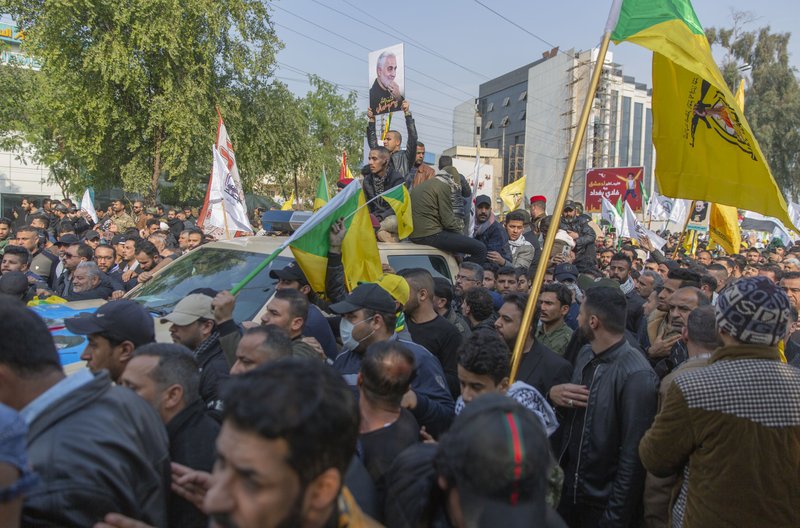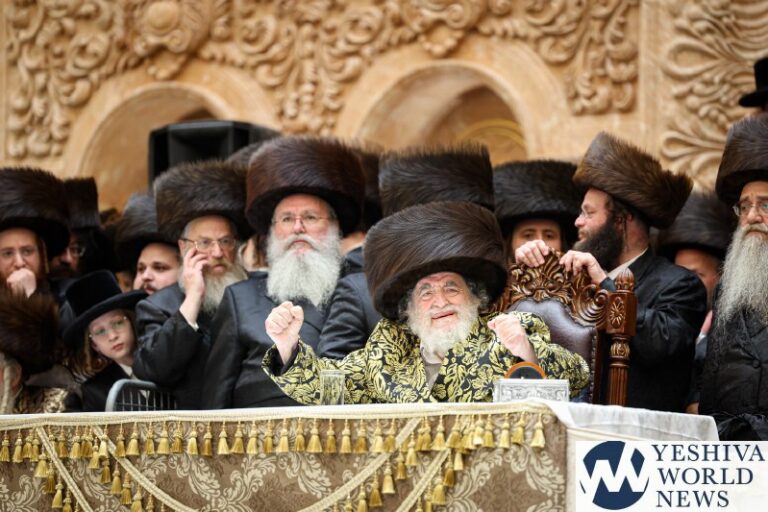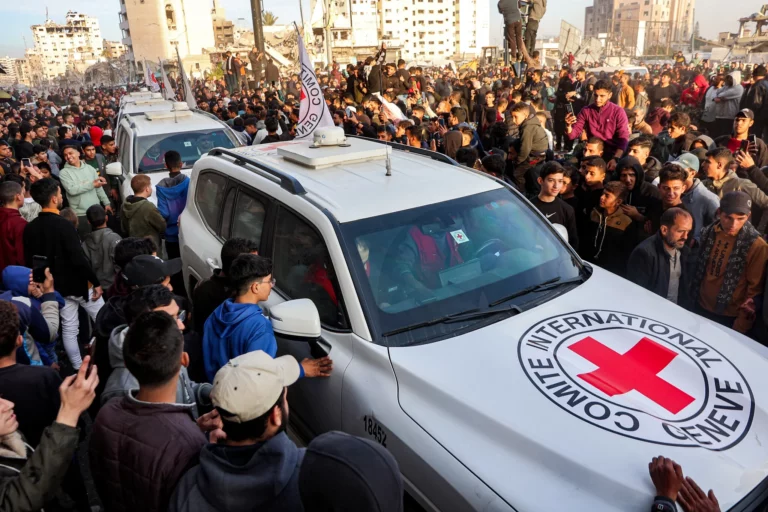Thousands took to the streets of Baghdad for the funeral procession of Iran’s top general Saturday after he was killed in a U.S. airstrike, as the region braced for the Islamic Republic to fulfill its vows of revenge.
The day of mourning in the Iraqi capital ended Saturday evening with a series of rockets that were launched and fell inside or near the Green Zone, which houses government offices and foreign embassies, including the U.S. Embassy.
Iran has vowed harsh retaliation for the U.S. airstrike ordered early Friday by President Donald Trump that killed Gen. Qassem Soleimani, the head of Iran’s elite Quds Force and mastermind of its regional security strategy, and several senior Iraqi militants. The attack has caused regional tensions to soar, raising fears of an all-out war, and tested the U.S. alliance with Iraq.
Trump says he ordered the strike, a high-risk decision that was made without consulting Congress or U.S. allies, to prevent a conflict. U.S. officials say Soleimani was plotting a series of attacks that endangered American troops and officials, without providing evidence.
Soleimani was the architect of Iran’s regional policy of mobilizing militias across Iraq, Syria and Lebanon, including in the war against the Islamic State group. He was also blamed for attacks on U.S. troops and American allies going back decades.
Though it’s unclear how or when Iran may respond, any retaliation was likely to come after three days of mourning declared in both Iran and Iraq. All eyes were on Iraq, where America and Iran have competed for influence since the 2003 U.S.-led invasion.
After the airstrike early Friday, the U.S.-led coalition has scaled back operations and boosted “security and defensive measures” at bases hosting coalition forces in Iraq, a coalition official said on the condition of anonymity according to regulations. Meanwhile, the U.S. has dispatched another 3,000 troops to neighboring Kuwait, the latest in a series of deployments in recent months as the standoff with Iran has worsened.
In a thinly veiled threat, one of the Iran-backed militia, Asaib Ahl al-Haq, or League of the Righteous, called on Iraqi security forces to stay at least 1,000 meters (0.6 miles) away from U.S. bases starting Sunday night.
“The leaders of the security forces should protect their fighters and not allow them to become human shields to the occupying Crusaders,” the warning statement said, in reference to the coalition bases.
An Iraqi security official said there were no injuries reported from the series of rockets launched Sunday evening. A Katyusha rocket that fell inside a square less than one kilometer from the U.S. embassy, according to the official who spoke on condition of anonymity because he was not authorized to speak to reporters. Another rocket in Baghdad landed about 500 meters from As-Salam palace where the Iraqi President Barham Salih normally stays in Jadriya, a neighborhood adjacent to the Green Zone, the official said.
Another security official said three rockets fell outside an air base north of Baghdad were American contractors are normally present. The rockets landed outside the base in a farm area and there were no reports of damages, according to the official.
Also on Saturday, a spokesman for the Iraqi armed forces said the movement of coalition forces, including U.S. troops, in the air and on the ground will be restricted, conditioned on receiving approval from Prime Minister Adel Abdul-Mahdi, the commander in chief of the armed forces.
It was not immediately clear what the new restrictions would mean, given that coalition troops were already subject to limitations and had to be coordinated with the Joint Operation Command of top Iraqi military commanders.
NATO temporarily suspended all training activities in Iraq due to safety concerns, Canadian Defense Minister Harjit Sajjan said Saturday.
Iraq’s government, which is closely allied with Iran, condemned the airstrike that killed Soleimani, calling it an attack on its national sovereignty. Parliament is meeting for an emergency session Sunday, and the government has come under mounting pressure to expel the 5,200 American troops based in the country, who are there to help prevent a resurgence of the Islamic State group.
In Baghdad, thousands of mourners, mostly men in black military fatigues, carried Iraqi flags and the flags of Iran-backed militias that are fiercely loyal to Soleimani at Saturday’s ceremony. They were also grieving Abu Mahdi al-Muhandis, a senior Iraqi militia commander who was killed in the same strike.
The mourners, many of them in tears, chanted “No, No, America,” and “Death to America, death to Israel.” Mohammed Fadl, a mourner dressed in black, said the funeral is an expression of loyalty to the slain leaders. “It is a painful strike, but it will not shake us,” he said.
Helicopters hovered over the procession, which was attended by Abdul-Mahdi and leaders of Iran-backed militias. The procession later made its way to the Shiite holy city of Karbala, where the mourners raised red flags associated with unjust bloodshed and revenge.
The slain Iraqi militants will be buried in Najaf, while Soleimani’s remains will be taken to Iran. More funeral services will be held for Soleimani in Iran on Sunday and Monday, before his body is laid to rest in his hometown of Kerman.
The U.S. has ordered all citizens to leave Iraq and temporarily closed its embassy in Baghdad, where Iran-backed militiamen and their supporters staged two days of violent protests earlier this week in which they breached the compound. Britain and France have warned their citizens to avoid or strictly limit travel in Iraq.
No one was hurt in the embassy protests, which came in response to U.S. airstrikes that killed 25 Iran-backed militiamen in Iraq and Syria. The U.S. blamed the militia for a rocket attack that killed a U.S. contractor in northern Iraq.
Tensions between the U.S. and Iran have steadily intensified since Trump’s decision to withdraw from the 2015 nuclear deal and restore crippling sanctions, which have devastated Iran’s economy and contributed to recent protests there in which hundreds were reportedly killed.
In an apparent effort to defuse tensions, Qatar’s foreign minister, Sheikh Mohammed bin Abdulrahman Al Thani, made an unplanned trip to Iran where he met with Rouhani and other senior officials.
Qatar hosts American forces at the Al-Udeid Air Base and shares a massive offshore oil and gas field with Iran.
Secretary of State Mike Pompeo spoke with various world leaders including Iraqi President Barham Salih, Turkish Foreign Minister Mevlut Cavusoglu and Abu Dhabi Crown Prince Sheikh Mohammed bin Zayed Al Nahyan, of the United Arab Emirates. “I reaffirmed that the U.S. remains committed to de-escalation,” Pompeo tweeted.
As threats of “harsh revenge” against the U.S. looms, major streets in Iran were filled Saturday with billboards and images of Soleimani, who was widely seen as a national icon and a hero of the so-called Axis of Resistance against Western hegemony.
Iranian President Hassan Rouhani visited Soleimani’s home in Tehran to express his condolences. “The Americans did not realize what a great mistake they made,” Rouhani said.
On the streets of Tehran, many mourned Soleimani.
“I don’t think there will be a war, but we must get his revenge,” said Hojjat Sanieefar. America “can’t hit and run anymore,” he added.
Another man, who only identified himself as Amir, was worried.
“If there is a war, I am 100% sure it will not be to our betterment. The situation will certainly get worse,” he said.
In a sign of his regional reach, supporters in Lebanon hung billboards commemorating Soleimani in Beirut’s southern suburbs and in southern Lebanon along the disputed border with Israel, according to the state-run National News Agency.
Both are strongholds of the Iran-backed Hezbollah militant group, whose leader, Hassan Nasrallah, has close ties to Soleimani.
Palestinian factions in the Gaza Strip, including the territory’s Hamas rulers, opened a mourning site for the slain general and dozens gathered to burn American and Israeli flags.
The killing of Soleimani was “a loss for Palestine and the resistance,” said senior Hamas official Ismail Radwan.
(AP)











